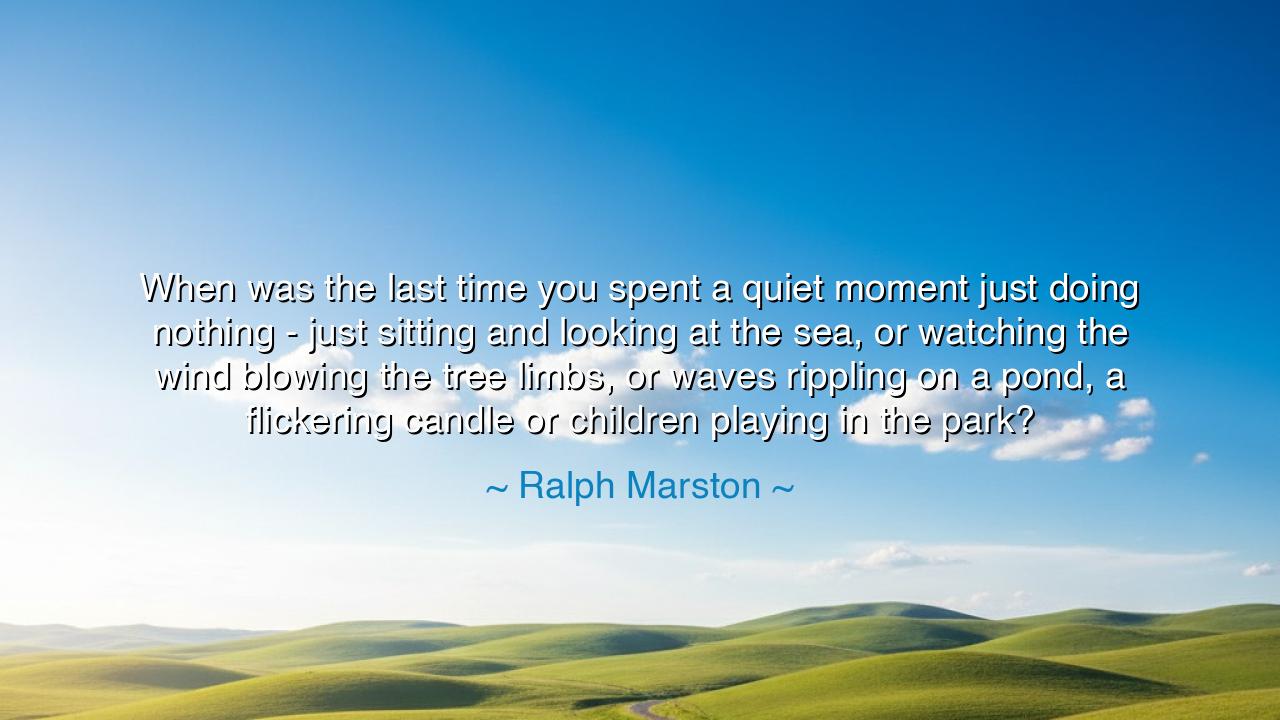
When was the last time you spent a quiet moment just doing
When was the last time you spent a quiet moment just doing nothing - just sitting and looking at the sea, or watching the wind blowing the tree limbs, or waves rippling on a pond, a flickering candle or children playing in the park?






Ralph Marston, a modern voice of reflection and stillness, asked with piercing simplicity: “When was the last time you spent a quiet moment just doing nothing—just sitting and looking at the sea, or watching the wind blowing the tree limbs, or waves rippling on a pond, a flickering candle or children playing in the park?” These words, though gentle, strike with the power of a question that unsettles the restless heart. They remind us of what has been lost in an age of haste: the art of stillness, the sacred act of simply being.
The meaning of this question lies in its challenge. We measure our days by tasks completed, goals achieved, and burdens carried, yet seldom do we measure the soul’s rest. To sit quietly, to gaze upon the sea or the flicker of a candle, is not waste but renewal. In those silent moments, the heart is washed clean, and the mind rediscovers its strength. Marston warns that without such stillness, we are like warriors who never sheath their swords, destined to be worn down not by battle alone but by the weight of ceaseless motion.
The origin of such wisdom reaches back to the ancients. The Stoics of Greece and Rome spoke often of contemplating nature, for in the sight of trees swaying or rivers flowing they found harmony with the eternal order. The mystics of the East taught meditation, the discipline of sitting in silence to taste the present moment. Even in the Scriptures, one reads: “Be still, and know that I am God.” Thus Marston’s question is not new, but part of a river of wisdom flowing from ages past—reminding us that true vision comes not from constant striving, but from quiet watching.
History shows us luminous examples of the power of stillness. Consider the life of Isaac Newton, who, in the quiet of his mother’s orchard, watched an apple fall and began to ponder the law of gravity. It was not in the clamor of noise, but in a moment of watching that the secrets of the universe whispered themselves to him. Or remember Buddha, who, after years of striving, found enlightenment not in struggle but in silent meditation beneath the Bodhi tree, gazing at the world in stillness. These examples prove Marston’s truth: stillness is not idleness, but the birthplace of wisdom.
The lesson we must take is this: reclaim quiet moments as sacred. In them, we are not empty but filled. In them, we are not passive but receptive. To sit by the sea or under the branches of a tree is to remember that we are part of a creation vast and wondrous, not merely machines for labor. Without such remembrance, life becomes a blur of tasks and noise, leaving the soul thirsty though surrounded by abundance.
Practical wisdom follows: each day, carve out a portion of time for stillness. Do not wait for the world to give it to you; claim it as you would claim bread or water. Walk without your devices, sit without distraction, gaze upon the small wonders that surround you—the candle, the leaf, the ripple of water. Let your thoughts wander and return, like waves upon a shore. In this way, you will find your heart strengthened, your mind calmed, and your spirit awakened.
Thus Marston’s question resounds not as idle musing, but as a call to arms—though the arms he calls us to are not swords, but silence. “When was the last time…?” he asks, and in that asking lies the rebuke of our busyness and the invitation to peace. Let us answer not with words but with action: let us sit, let us look, let us breathe. For in those quiet moments, we rediscover ourselves, and in rediscovering ourselves, we rediscover life.






AAdministratorAdministrator
Welcome, honored guests. Please leave a comment, we will respond soon